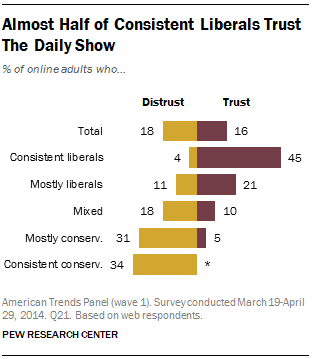☀️ Happy Thursday! The Briefing is your guide to the world of news and information. Sign up here!
In today’s email:
- Featured story: Joe Biden’s presidential campaign joins TikTok
- New from Pew Research Center: Key facts about Black Americans and the news
- In other news: How India’s prime minister uses social media
- Looking ahead: TikTok’s new policies ahead of EU elections
- Chart of the week: Who trusted The Daily Show when Jon Stewart was host?
🔥 Featured story
The Biden campaign has joined TikTok in hopes of reaching younger voters, even though an official White House policy bans TikTok from government devices.
About a third of U.S. adults ages 18 to 29 (32%) regularly get news from TikTok, according to a 2023 Pew Research Center survey. The Center also recently conducted a survey of U.S. teens ages 13 to 17, which found that over half (58%) use TikTok daily, including 17% who use TikTok “almost constantly.”
🚨 New from Pew Research Center
Black Americans have long had a complex relationship with the news media. For Black History Month, here are eight key facts about Black Americans’ experiences with and attitudes toward the news, based on recent Pew Research Center surveys.
📌 In other news
- How India’s prime minister is using social media as part of his political strategy
- A look at the American media industry as it grapples with layoffs and digital challenges
- City of Minneapolis settles lawsuit with journalists attacked by police after George Floyd’s murder
- A Q&A about the challenges facing music journalism
- Two Thai journalists arrested for covering a temple being graffitied
- Sesame Street’s Grover announces new job as a news reporter, though many predict a future layoff
📅 Looking ahead
TikTok announced Wednesday that the platform will implement several policies in preparation for the European Union elections taking place this summer. Measures include the removal of election and civic misinformation and collaboration with fact-checking organizations.
According to a 2022 Pew Research Center survey, people in seven of the 10 EU countries surveyed are more likely to say social media has been a good thing rather than a bad thing for democracy in their country. In the same survey, majorities of adults in all 10 of these EU countries say that the spread of false information online is a major threat to their country.
📊 Chart of the week
This week’s chart is from our archives.
After Jon Stewart returned to The Daily Show this week to host on Mondays during the presidential election year, we look back at data collected before Stewart stepped down in 2015.
According to a 2014 survey of online Americans, roughly equal shares said that they trusted (16%) and distrusted (18%) The Daily Show as a source of government and political news. There was a strong ideological split: Almost half (45%) of consistent liberals said they trusted The Daily Show, while fewer than 1% of consistent conservatives said the same.

👋 That’s all for this week.
The Briefing is compiled by Pew Research Center staff, including Naomi Forman-Katz, Jacob Liedke, Sarah Naseer, Christopher St. Aubin, Luxuan Wang and Emily Tomasik. It is edited by Katerina Eva Matsa, Michael Lipka and Mark Jurkowitz, and copy edited by Anna Jackson.
Do you like this newsletter? Email us at journalism@pewresearch.org or fill out this two-question survey to tell us what you think.